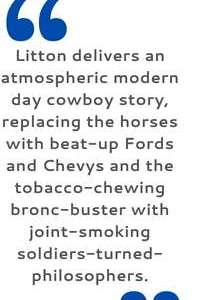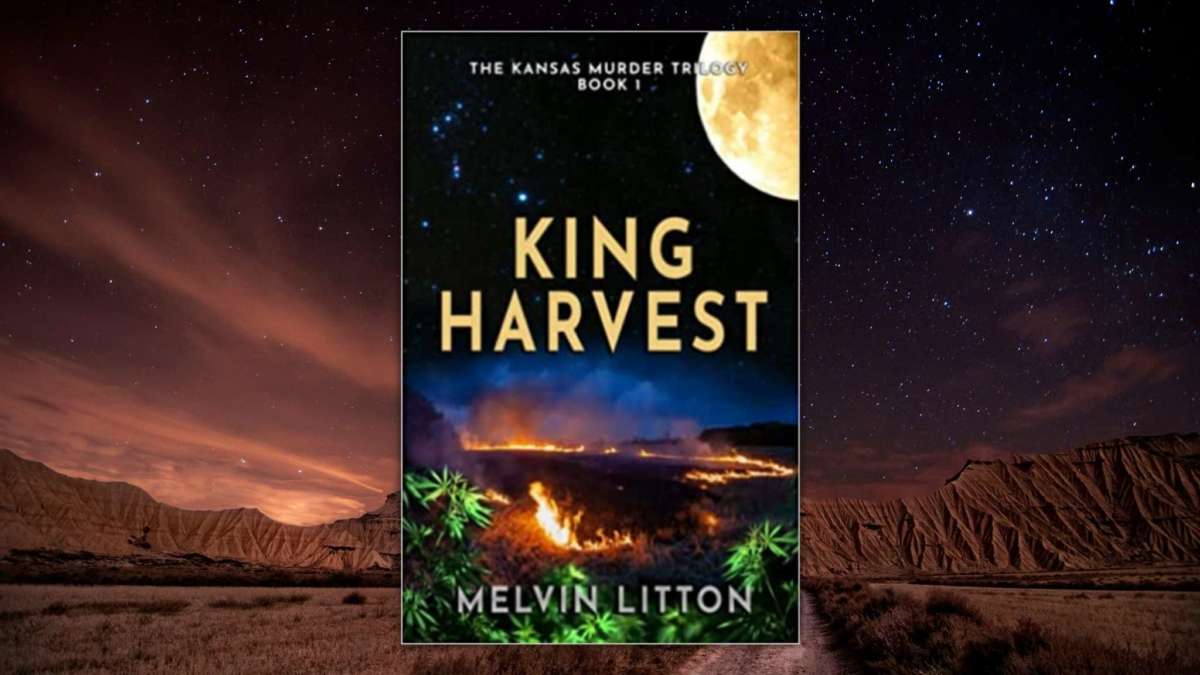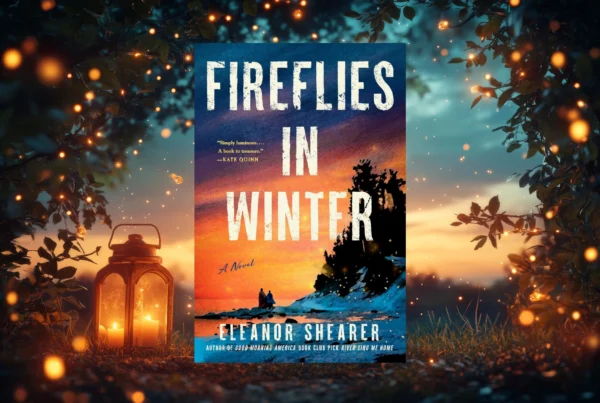King Harvest by Malvin Litton
In sultry summer of 1975 on the Kansas plains, a rowdy bunch known locally as “the boys” skirt the fine line of felonious law by harvesting wild hemp to sell on the illegal market. Better known as marijuana, the hemp grows thick across three counties and tempts the adventurous spirit of young men to earn quick, easy money. Led by their cunning and convivial leader, Frankie Sage, the boys are a motley crew fresh from the wounds of the Vietnam War seeking to find their unique path in the world.
High on life as well on marijuana, cocaine and alcohol, the young men bandy about their college-born philosophies amid a rising threat from other hemp-hunters in Range County, KS. But rival gang leader Valentine LaReese threatens their operation with his liberal use of gunplay out in the contested and isolated fields (thereby turning hemp harvesting from a misdemeanor to a felony). When a vicious and mysterious double murder on the border of two counties brings in the probing noses of two sheriffs, Frankie’s crew have worries aplenty.
The first in a projected trilogy that explores murder and mayhem in different eras of Kansas’ history, King Harvest (Crossroad Press) by Melvin Litton evokes a time and place at odds with the spirits of the young men and the women who love them. As Frankie attempts to broaden the scope of the hemp operation and convince Will, Lee, Jack, Gabe, Ry and Rus to sign on for more risk-taking, Lee struggles to find a balance with his wanderlust nature and the desires of his wife, Diana, to buy the farmhouse they rent — a haunted one, to boot — and raise their infant son, Jesse. Driven by the unsung songs in his heart, Lee hopes to someday move to Nashville and make a go of music, but the pull of the hemp and the Kansas wind that sings “an oddly reassuring song” keep him returning to the midnight forays in the hemp-laden back of beyond.
LITTON SPINS A TALE FLAVORED IN WESTERN-STYLE LANGUAGE AND ADVENTURE
But all is not right in Kansas as the heavy hand of the “King of the County,” ranch owner Colonel CC Holtz, demands tribute from the local lawless. A “native son and ranking citizen,” Holtz is reputable by day but at night has his fingers in nearly everything that makes illicit money. And hemp harvesting is one of them. Pulling the strings from behind his oak desk in his sprawling ranch house, Holtz soon realizes how much he can control — and who he cannot. It is the grisly murder of high school sweethearts — 18-year-old Joey Conners and his girlfriend, Cathy Torres — along County Line Road dividing Range and Sky Counties that begins the unraveling.
Finding the teens dead near their car, Range County Sheriff Guy Craig and Sky County Sheriff Hoss Wayne begin a tandem investigation that raises questions not easily answered. Shortly before he was murdered, Conners told a friend he had seen something horrible but could not say more. What had he seen and who silenced him? It is up to Craig and Wayne to pull apart the tendrils of lies and hidden identities that threaten to blow up into a larger conflagration among the rival hemp gangs, as well as Holtz and Mex, Holt’s longtime “employee” suspected of various misdeeds across the region … all heinous.

Litton spins a tale flavored in Western-style language and adventure, giving the “high” in High Plains Drifter an entirely new meaning. Instead of driving cattle, the roustabouts of Litton’s novel pick hemp, “a prime example of bootstrap capitalism” that still involves backbreaking labor reminiscent of their cowboy forebears:
“Harvest was an enterprise requiring considerable pluck and daring. Not for the timid and meek. It was hard, hard work. At peak season, in mid-to-late September when the seeds matured and stems were full, on any given night a crew of four good men could take out 1,000 pounds of wet hemp that would yield a dry weight of 200 pounds.”
AN ATMOSPHERIC MODERN DAY COWBOY STORY
The languid scenes of nightly hemp harvesting out in the lonely brush are at turns beautiful and eerie, as every twig snap, animal grunt, or far-off light can spell the boys’ capture or worse. It is only when the group is spotted one night harvesting in rival leader LaReese’s fields that the quiet of the Kansas night explodes in gunfire and the boys scatter to the four winds. Will they reunite and recoup what was lost? Will Lee and Diana be safe from the threats within and without their love-haunted home? And how long can Frankie Sage keep up his outlaw exploits with two county sheriffs cracking down on the chaos around them?
Litton delivers an atmospheric modern day cowboy story, replacing the horses with beat-up Fords and Chevys and the tobacco-chewing bronc-buster with joint-smoking soldiers-turned-philosophers. King Harvest is rich in characters and backstory, adding multiple layers to a straightforward conceit: choices have consequences, and they often reap the whirlwind. Readers will look forward to the second installment of the trilogy, which promises a new time, characters and story.




